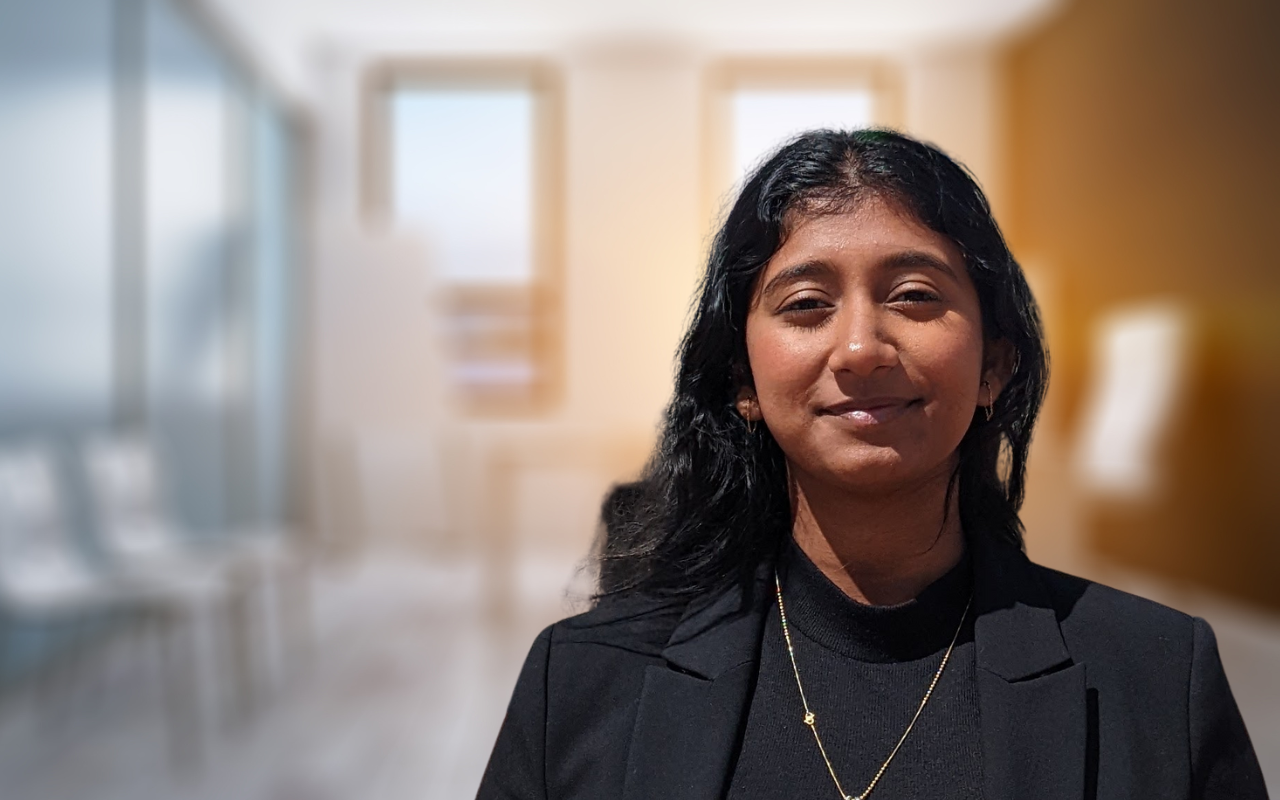We need to change the narrative of a career in general practice to ensure it is more respected, and more medical students choose to pursue this vital role, writes Tish Sivagnanan.
I chose to pursue a career in medicine because it resonates with my fundamental values: service, science and adventure. And I’m not alone in this decision. Many medical students are driven by the desire to contribute to humanity and make a difference in the lives of others.
On my first day of medical school we were guided through an activity that asked us to write down what type of doctor we wanted to be.
My answer: an empathetic, engaging and energetic doctor.
Yet, my journey as a medical student and as a patient has led me to reflect upon the current state of our health care system.
I find myself questioning whether I am part of a system that truly values, prioritises and enables high quality health care for everyone — a system where I can make my younger self proud.

Workforce concerns
There has been a longstanding geographic and specialty-based maldistribution of health care workers in Australia that has increasingly placed pressure on our health care system.
An underappreciated and undervalued primary health care workforce has exacerbated these pressures resulting in the realities we face today.
General practitioners are struggling to keep services accessible in the community, and doctors in the hospitals cannot keep up with growing health demands.
On my recent relocation to Far North Queensland, I came face to face with the challenges of our current health care system.
I found myself in a situation where I had two options: either wait for a week to secure an appointment at a bulk-billing clinic or pay a significant fee to see a doctor the next day.
Given the urgency of my medical needs, I opted to pay the fee and see a GP promptly.
However, this experience made me realise that if I had lacked the means to afford the fee, I would have been compelled to seek assistance at an emergency department for a situation that could have been adequately addressed within a community setting.
A systemic problem
No one person, organisation or institution can be blamed for the situation.
Our failings within our health care system can be attributed to the discordance in decision making by the various stakeholders within the health ecosystem.
However, we all have an onus of responsibility to work towards sustainably fixing the pitfalls of a system that is failing to serve all its people, with no one left behind.
If we do not take tangible action to address the deficits and shortcomings of our health system at every stage of clinical education and service pipeline, we are inherently facilitating the demise of universal health care within our nation.
Numerous reports have consistently highlighted the disproportionate impact of limited health care access on individuals residing in low socio-economic areas (here, here and here).
As recently as April of this year, the Royal Australian College of General Practitioners confirmed the closure of more than 60 practices within the past four years, exacerbating the plight of vulnerable patients who are most likely to bear the brunt of these closures.
To actualise a society built on the belief that access to health care is a human right, we must act and reverse this trend.
The vital role of GPs
General practices are the most widely used health service.
Data from the Australian Bureau of Statistics shows that in 2017, eight in ten people accessed GP services.
The benefits of having a regular GP are paramount from having a homebase to coordinate your health care needs to consulting a doctor that knows you as an individual, tailoring treatments to best suit you.
Continuity of care through a sustained doctor–patient relationship with a GP has been attributed to better health outcomes and increased uptake of preventive health measures.
Hence, there is no questioning the pivotal role of a GP in the health care of an individual.
Stable, functional and well supported general practices are widely acknowledged as the foundation of a system that truly values, prioritises and enables high quality health care for everyone. It is evident that the establishment of a strong and robust primary health care system is the key to enabling a health system that truly serves its people, a health system that I am inspired to be a part of, a health system we can be proud to promote.
The Australian General Practice Training Program summarises the career by stating that, “Being a GP is not just a highly rewarding, challenging, and flexible career, it’s the most important role in Australia’s healthcare system.”
Anecdotally, the benefits of a career in general practice are often quoted to be the lifestyle, satisfactions of building long term partnerships with patients, and the ability to practise general medicine while subspecialising in various skills and areas.
On paper, general practice simply sounds like the dream career! However, currently only just over 13% of medical students show interest and/or intention to pursue general practice upon graduation.
A lack of support, appreciation and understanding of general practice has informed a perception of the GP role as an isolating, lacklustre career with little to no recognition, dissuading many medical students and junior doctors from pursing this career pathway.
Recent steps to address these concerns have seen the Australian Government establish and extend trials for the Single Employer Model and a tripling of the Medicare incentive, to institute tangible action in changing the narrative of general practice.
These are welcome steps in immediately ensuring the presence of a health care system that can provide for its most vulnerable people.
Moving forward, we must ensure that sustainable solutions are developed to address the disinterest and prevalent beliefs that exist among health professionals and society at large.
The steps taken in the past six months guide me to believe that I am part of a profession that has recognised the need for radical change.
Whether it be through structural reform to medical education or a rebranding of the primary health care system, there is no doubt that the next steps are multifaceted and will likely challenge the status quo of medical education, training, and the health workforce.
So, to be an empathetic, engaging and energetic doctor … I haven’t lost hope yet!
Tish Sivagnanan is President of the Australian Medical Students’ Association and a 5th year medical student at James Cook University, with a passion for health advocacy.
The statements or opinions expressed in this article reflect the views of the authors and do not necessarily represent the official policy of the AMA, the MJA or InSight+ unless so stated.
Subscribe to the free InSight+ weekly newsletter here. It is available to all readers, not just registered medical practitioners.
If you would like to submit an article for consideration, send a Word version to mjainsight-editor@ampco.com.au.

 more_vert
more_vert
Thanks Dr Tish Sivagnanan for a very timely article. General Practice like all other aspect of medical fields has its unique attractions and problems. I find GPs are all exhausted and hence has less time to pay attention to the governance aspects of their job. Their position in the medical fraternity is always the distant cousin. Our jobs are in constant threat of being taken over by our Pharmacist friends, the hospital midwives and all of that is silently ignored by the government where the major interest is fiscal.
We are also responsible for this .To manage our future I think the younger generation should not depend on bureaucrats and non-GPs and take control of their destiny . We need to have more representation in AHPRA/Medicare and the likes. Finally we are still hopeful that RACGP and AMA will see that General Practice is a Speciality that we decide to join as a first choice that delivers a complex care to the majority of Australians.
Medical graduates are increasingly put off by the total lack of respect for general practitioners. Adele Ferguson didn’t win a journalism award for a series of articles accusing cardiologists of rooting medicare. Similarly, we see pharmacists, online telehealth companies and nurse practitioners continuously trying to usurp the role of GPs in primary care. They don’t go after paediatricians or dermatologists.
Tish Sivagnanan you are part of a profession that has recognised the need for radical change. Medicine is a fantastic career. It is a privilege to witness the courage of our patients and gain extraordinary insight into ordinary life. Whatever our speciality, how lucky we are to continuously learn about cutting-edge healthcare advancements and develop bonds with colleagues who become lifelong friends across state and international borders. In our communities, it can be deeply rewarding to provide the highest standard of healthcare to our patients and to be recognised as respected medical leaders.
Medicine is also currently facing enormous challenges, but the medical profession has more influence than realised to effect radical change – if we unite in our advocacy. With inspirational medical leaders like you, I am more hopeful than ever about our future.
Thank you so much for your opinion piece.
As a general practitioner in a similar medical system (Canada), control of your work destiny lies with those decisions made by government. Only active involvement in shaping policy can counteract decades of apathy and mismanagement which have brought us to this point.
I’m glad you have hope, but recognize the hard work that lies ahead. I do appreciate your interests of service, adventure and science but also bear in mind the challenges of maintaining a personal life, such as partnerships, family and children aka the stuff that makes you human. The demands on your time will be great, but also will be the potential rewards. All the best to you
There is no mystery here….
MEDICARE HAS DESTROYED GENERAL PRACTICE.
Get rid of Medicare.
Care for the disadvantaged… and let the others care for themselves.
Thank you for your perspective as a younger person on the threshold of your career in medicine. Of concern is that you “haven’t lost hope yet” Recalling as best I can, when in your position decades ago, my generation shared your values and aspirations, but had an abundance of hope about our ability to deliver on them. So what has changed? Perhaps that medicine was then in the hands of the profession, and now is in the hands of politicians, corporates and bureaucrats. So the message for medical students and all doctors is to do what we can to regain control of our profession and its dedication to service above the agendas of politics and profit. It is not possible to be assured of hope when denied opportunity to be master of one’s destiny.
Fantastic article, and incredible insight by a young, emerging doctor. We must change the narrative around primary care and general practice if we want a high-quality, universal healthcare system that delivers for all Australians. Healthcare is not a cost – it’s an investment in human potential. Primary care is an investment in the future of all Australians. Hospital specialists have an important role to play in shaping the decisions of medical students – they should be our greatest allies. We need to find better ways to work together for the benefit of the system.
Wait till you actually start practicing you will realise most of why people don’t want to be gps is because they want to make more money – most people start medicine for one reason and at the end keep doing it for another – money
Economics 101: Anything that is “free” gets overused and under-valued. Thus, you see the hidden cost of waiting times being added to “free” health services.
Economics 102: There are always trade-offs and systems gradually balance these trade-offs. There are advantages and disadvantages to living in rural communities.